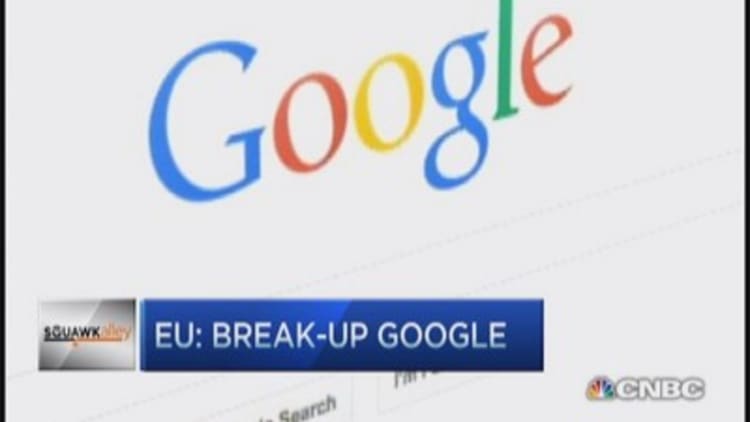Google is overhauling its European business to meet the challenge of a changing and more combative regulatory landscape on the continent where politicians and commercial rivals are pushing to curb its power.
After a year of setbacks in Brussels, Berlin and beyond, the U.S. technology company is unifying its two separate European arms, which had been split into geographic groupings.
Matt Brittin, who previously led Google's northern and western European arm, will take over the day-to-day running of the new business, with country leaders reporting directly to him. He will be based in London.
The rethink reflects mounting concern in Google over its business environment and image in several European states where local problems have rapidly morphed into company-wide issues.
Google's activities have become the focal point of a backlash against Silicon Valley groups in Europe, sparked by concerns over U.S. internet surveillance,tax avoidance and commercial dominance.
A leading threat comes from Brussels, where the European Commission has reopened its antitrust inquiry into Google's search engine, a move that could tangle the US group up in legal proceedings for several years.
The company also faces governmental and legal pressure over its activities in several individual countries, including the UK, Germany, France, Spain and Russia.
Mr Brittin said one structure would enable the company to respond better to local conditions and opportunities. Google will also announce new initiatives aimed at winning over Europe's sceptics. In a speech in Brussels on Thursday, Mr Brittin will say Google is pledging to train 1 million Europeans with "digital skills" over the next two years.
He will add that Google supports plans to create a "single digital market", a key proposal from European Commission president Jean-Claude Juncker.

Mr Brittin said the changes were also a response to competitive pressures, particularly from Silicon Valley rivals, which are forcing it to respond more quickly to local trends. "Just talking with publishers the other day, many get most of their traffic from Facebook or Twitter, not from Google," he told the Financial Times. "We're in a world where the dynamics and competition is speeding up."
Carlo D'Asaro Biondo, who has led the company's southern and eastern European operations, will now be responsible for relationships with Google's commercial partners in the region.
The consolidation of Google's continental business was prompted by recent events and an admission that it needs to regroup, after finding that local grievances spread beyond the borders of individual countries.
One such event was last May's ruling by the European Court of Justice, which gave citizens the "right to be forgotten" online. The judgment caught Google by surprise, according to company insiders.
The case originated in Spain and was eventually heard by Europe's top court based in Strasbourg. Google built teams in a number of countries, tasked with dealing with requests from 28 EU member states to expunge sensitive links from its search results.
Other threats to the company remain. Mr Brittin will lead the fightback on the continent, where the European Commission has reopened its antitrust inquiry into the group's search engine.
This could lead to Google being tangled in costly and distracting legal proceedings for several years, a fate that befell Microsoft and Intel in the past.
Richard Holway, chairman of TechMarketView, the industry analyst, said other major US groups already adopt a unified grouping, saying this was necessary given how the "EU speaks with one powerful voice to big tech companies".
"You can't always be unconventional," he said. "This is part of Google growing up. It's adopting the same sort of corporate structure that has been tried and tested in Europe."
The split structure — put in place by Nikesh Arora, Google's former sales chief — was seen as a way of creating internal competition between departments.
But Luca Paderni, an analyst at Forrester Research and a former Google executive, said this structure was broken as the company's business had sprawled beyond making money from paid search results. "It was always a strange set up in the past," he said. "It was an internal organisational decision, rather than market strategy."
Google's European headquarters are in Dublin, where the company employs about 4,500 people and has been able to take advantage of the "double Irish" corporate tax regime, a concern for some European governments.
In the UK, George Osborne, Chancellor of the Exchequer, has announced plans to — which some have dubbed the "Google tax" — targeting "some of the largest companies in the world, including those in the tech sector, [that] use elaborate structures to avoid paying taxes". Its implementation is likely to be watched by European governments that have criticized Google's tax regime.
French and German ministers have proposed joint measures to regulate internet platforms, urging the European Commission to consider legislation to ensure "positions of economic power remain open to competition".
Privacy watchdogs in all EU member states are threatening legal action over Google's implementation of the bloc's "right to be forgotten" laws.
But the company has also shown a willingness to go on the offensive. It shut down Google News, for example, in response to a local law designed to make it pay Spanish publishers fees for linking to articles. Similar regulations have been attempted in Germany.
Mr Brittin conceded that it is "definitely the case that the environment we operate in today is more complicated than five or six years ago".
Earlier this month, Barack Obama, US president, argued that scrutiny of Silicon Valley companies was a form of corporate protectionism, saying: "In defenseof Google and Facebook, sometimes the European response here is more commercially driven than anything else."
Mr Brittin offered a diplomatic response to the president's remarks, calling on Europe's public, companies and lawmakers to work more closely with Google.
"We probably feel differently from the US president," he said. "We want to encourage Europe to embrace the opportunity, as well as protecting the values and the history that we have."




